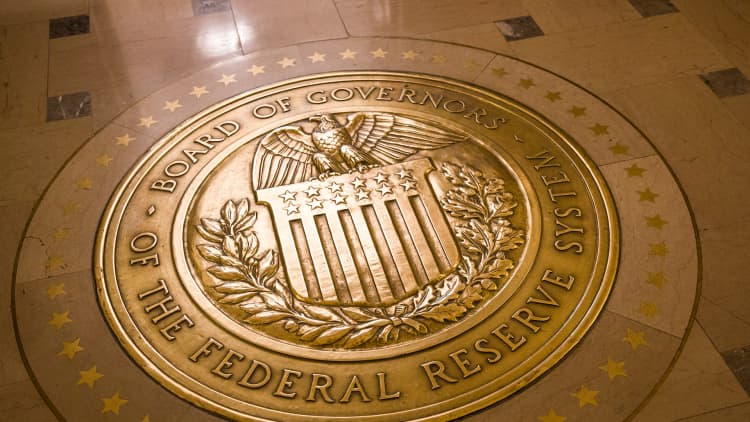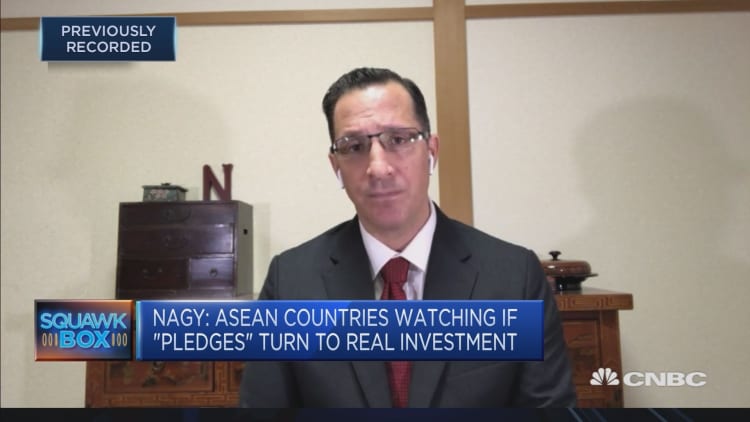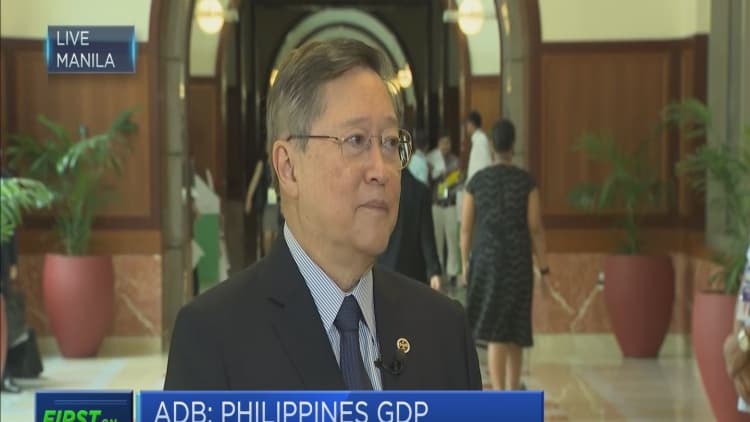The Philippines' new central bank governor was sworn in Wednesday. But the appointment of Benjamin Diokno, a former member of Philippine President Rodrigo Duterte's administration, has some people worried.
Political and financial watchers, both within the country and outside, were surprised when Duterte appointed his former budget secretary as head of the Philippine central bank — or Bangko Sentral ng Pilipinas.
Some analysts saw the decision as politically motivated and fear it may threaten the independence of yet another public institution in the country. The fell after his appointment.
When the top job at the central bank became vacant, analysts and the financial industry widely expected Duterte to pick one of the three deputy governors — or at least someone within the institution — to fill the position. The previous governor, Nestor Espenilla, died in February after a battle with cancer.
It caught the public by surprise too. Diokno was not among the front-runners when Filipinos were discussing potential candidates who did not work in the central bank.

The former budget secretary is the first person to move directly from the cabinet to the top job at the central bank, according to The Wall Street Journal.
Despite his lack of experience working in a central bank, Diokno appeared qualified for the position: He holds a doctorate in economics and taught that subject for 40 years in a university in the Philippines. He's also served several administrations in roles that shaped the country's economic policies.
Duterte's office did not immediately respond to CNBC's request for comment. In a Tuesday statement, chief presidential legal counsel and presidential spokesperson Salvador Panelo said Diokno stood out among the names submitted for Duterte's consideration. The spokesman added that Diokno is "a man of integrity, competence, and expertise — traits which fit best the position."
The new central bank governor also defended his own appointment, saying that he's not a politician and his background in economics provides him the know-how of monetary policy regulation, according to the Philippine News Agency, the official newswire of the government.
Even so, "there were likely political motives" behind Diokno's appointment, according to Peter Mumford, practice head for Southeast and South Asia at political risk consultancy Eurasia Group.

"Recent events do not provide the ideal backdrop for Diokno to assume the governorship," Momford wrote in a Monday note.
As central bank head, Diokno will also chair the government's Anti-Money Laundering Council at a time when his own credibility in handling national finances has come under scrutiny.
Members in the Philippine House of Representatives have in recent months raised questions about the country's 2019 budget prepared under Diokno's watch, and accused him of favoring his relatives in government contracts. An investigation into the accusations was launched and remains unresolved, according to recent local media reports.
The central bank governor denied those allegations, and the incident caused a rift between members in Duterte's cabinet and the House.
Moving Diokno to the central bank could be Duterte's way of soothing relations between both sides, while still keeping the former budget secretary in the president's economic team, said Mumford.
Duterte politics
Whatever his intentions, the Philippine president's decision regarding Diokno is seen by some analysts as another example of Duterte politicizing an institution that's supposed to be independent and neutral.
"The move raises questions about the politicisation" of the central bank, Alex Holmes, Emerging Asia economist at consultancy Capital Economics, wrote in a Tuesday report. "The news does add to the catalogue of evidence that Duterte is willing to break norms and politicise ... institutions."
Holmes noted that previous governors were usually promoted from the ranks of deputy governors who have served in the central bank for many years.
Under Duterte, who's no stranger to controversies, checks and balances within several public institutions in the Philippines have weakened partly due to the president's "disdain" for people who oppose his policies, according to a January report by David Timberman, an independent analyst focusing on political and development issues in Asia.
Timberman's report, posted by think tank Carnegie Endowment for International Peace on their website, cited an example of former Supreme Court Chief Justice Maria Lourdes Sereno, who was ousted after speaking out against Duterte's deadly drug war.
Investor worries
Investors have shown their concerns: The weakened by nearly 1 percent against the U.S. dollar on Tuesday, following the Monday evening announcement of Diokno's appointment. The currency's slide against the greenback continued on Wednesday.
Diokno is not known to be politically aligned, having worked under several presidents before Duterte came to power in 2016, Holmes noted. Nevertheless, his appointment could still threaten the impartiality of the central bank which — according to Nikkei Asian Review — is often seen as one of the Philippines' best-run institutions.
A central bank plays a role in maintaining a country's financial and economic stability through tools such as interest rates and buying or selling bonds. Its independence is crucial in assuring investors that it would do the right thing for the economy, especially during difficult times, regardless of political pressure.

"There is a risk that markets ultimately become less confident in the [Philippine central bank's] independence and willingness to tackle inflation and financial risks," said Holmes.
In his previous position in the Duterte cabinet, Diokno was said to favor policies that promote growth, such as higher government spending and a low interest rate environment. Those inclinations by a central bank governor would allow Duterte's administration to raise funds at a cheaper rate for their economic agenda — such as a multi-billion dollar infrastructure initiative called the "Build, Build, Build" program.
But according to Japanese bank Mizuho, such a move doesn't bode well for the government's budget discipline, given that the country's fiscal deficit has widened over the last year. Inflation in the Philippines has also just started to settle down after shooting up last year, and the currency recently rebounded, the bank said in a report.
"In (the) context of Diokno's previous role as Budget Secretary, his appointment may be perceived as prodding the (central bank) to become more attuned to government financing needs," Mizuho said, adding that loosening monetary policy before economic conditions in the country stabilize could once again cause inflation to rise and the currency to suffer.


